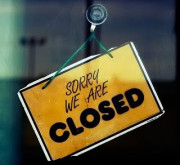Whitcomb: New School Evaluations; Sasse on Taxes; Christmas Pushback; Regional Carbon Control
Sunday, December 23, 2018
“This world is wild as an old wives' tale,
And strange the plain things are,
The earth is enough and the air is enough
For our wonder and our war;
But our rest is as far as the fire-drake swings
And our peace is put in impossible things
Where clashed and thundered unthinkable wings
Round an incredible star.
To an open house in the evening
Home shall men come,
To an older place than Eden
And a taller town than Rome.
To the end of the way of the wandering star,
To the things that cannot be and that are,
To the place where God was homeless
And all men are at home.’’
GET THE LATEST BREAKING NEWS HERE -- SIGN UP FOR GOLOCAL FREE DAILY EBLAST
-- ‘’The House of Christmas’’, by G.K. Chesterton
xxx
“The gospel left behind by Jay Gould {19th Century robber baron) is doing giant work in our days. Its message is ‘Get money. Get it quickly. Get it in abundance. Get it in prodigious abundance. Get it dishonestly if you can, honestly if you must.’’
-- Mark Twain, in 1892, on the death of Jay Gould. One thinks of the disgraced Michael Flynn and other past and present servants of Trump. Their own worst instincts, for greed and conspiracies, were multiplied, and in some cases tinctured with treason, by proximity to the mobster in whom they had invested their hopes for fortune and power.
Ho-Ho Help
Getting through Christmas: There’s jollity, forced or otherwise; there’s the purely materialistic approach; the religious; the secular meditative and ruminative as we near the end of another year, and the melancholy, especially for people living alone, or going through a nasty divorce or just mentally or physically sick.
After childhood, and its piles of presents and glittery meals, I lost my taste for the American Christmas, with its frantic buying, social overscheduling, excessive drinking and nightmarish travel. (Those long drives on icy roads, the cancelled flights because of a blizzard in Chicago, etc.) The obligatory purchases (and the January bills).
I grew to sometimes like working on Christmases (and other holidays) in the newspaper business over the years, with a skeleton staff, the offices quiet and the top bosses away. (We worked on the next day’s paper.) And I liked Christmas in Paris, where we lived for a few years. There the holiday was celebrated at what I thought was about the right level of intensity. The French celebrate Christmas, too, of course, but in a much lower-key way. Our big event was a Christmas Eve dinner at the apartment of (French) friends in our neighborhood and the distribution of a few gifts. I miss it. Other Europeans tell me similar stories.
I’ve long been surprised that more people don’t push back hard against the advertising industry and social pressures and enjoy a quiet Christmas, or happily ignore the holiday entirely. But then, that might require making travel arrangements for a trip to the moon, or perhaps to an obscure Muslim country, such as Chad.
It may be time to join the “buy no stuff for Christmas’’ movement you hear about in media like NPR. Or maybe make it next year….
Still, a smile, especially of a child, the sound of bells, an old maudlin Christmas song and the smell of incense in a church in this surreal season can transport you to warm and comforting places in the mind, and even a sense of the numinous, if only for a moment.
Better or Just Looser School Evaluations?
Rhode Island has launched a new, much more qualitative system for measuring the “success ‘’ of public schools in, well, educating their students. The old system based the evaluations on how well students did on standardized tests. The new one includes such criteria as whether performance is improving, as well as student-suspension and graduation rates (the last of which can partly be the result of schools’ “social promotion’’: just move the kids out, whatever their real grades, to make room for younger ones). Overall, the new program gives schools more flexibility in doing things to meet state criteria.
It will take some time to figure out the new arrangement but I worry that some of it may be a partly politically motivated way of evading rigorous and quantitatively measurable standards – and embarrassing news stories. Those standards are needed to determine the real achievement of students and the best ways of allocating resources so that Rhode Island schools start to be more competitive with Massachusetts’s best-in-the-nation students and schools.
The Breakers’s Welcome Center Revenue
The Preservation Society of Newport County has told me that for the six months July to December (month-to-date) this year the new Welcome Center at The Breakers mansion has brought the society $350,000 more than it got in the year-earlier period at The Breakers. Back then, the center hadn’t yet opened and only memberships and tickets were for sale. The Welcome Center sells beverages and light meals. The society said that was a 10 percent increase in revenue for the society at The Breakers.
Of course, the Welcome Center aroused much neighborhood opposition, which delayed it for years. Foes were divided between those who didn’t want the new facility at all and those who wanted it, if it had to be built, across the street from The Breakers, the most famous Newport mansion.
Not Exactly Tax Hell
It was refreshing to read the remarks in GoLocalProv.com of Gary Sasse, who now heads the Hassenfeld Institute at Bryant University and has been a fiscal expert for many years, working in the public and private sectors.
In his piece, Mr. Sasse tried to disabuse Rhode Islanders of the idea that the state is “tax hell.’’ While some taxes are high, some are below the national average and the state has a fairly equitable tax system when looked at in a national context. The biggest issue is not state taxes but the local property tax, which of course varies widely by community. The state’s per-capita property-tax collections are, when adjusted for the size of the state, 54 percent higher than the national average. The trick is to fix that, but, of course, that would require some major rejuggling of statewide taxes.
Consider, he writes, that “Rhode Island ranked 7th nationally in tax paid per $1,000 of personal income. This ranking was driven by high property taxes. The state ranked 27th in individual income tax paid per $1,000 of income, 38th in sales taxes {remember that lots of items are excluded from the sales tax} and 26th for all other taxes.’’ The 7th ranking is high but not far from where you’d think a densely populated state in the Northeast would land. Unlike, say, Mississippi, folks in the Northeast and Middle Atlantic states expect a fairly dense system of social services. Rhode Island is usually ranked around 20th in median household income.
To see Mr. Sasse’s GoLocal piece, please hit this link:
States Join in Carbon Control Compact
Louis Brandeis, the late Supreme Court justice, famously called states "laboratories of democracy," describing how a "state may, if its citizens choose, serve as a laboratory; and try novel social and economic experiments without risk to the rest of the country."
We now have a new and happy example of this in an agreement by Massachusetts, Rhode Island, Connecticut, Vermont, Delaware, Maryland, Pennsylvania, New Jersey, Virginia and the District of Columbia to impose regionwide limits on transportation emissions, which are America’s largest source of carbon pollution. New York and Maine are expected to soon join the compact. It’s unclear if New Hampshire will.
Under the plan, the states would have a year in which to create a system to cap total emissions, a system that would include requiring gasoline and diesel distributors to buy pollution permits for some of the carbon they’re partly responsible for putting into the air. The money would be used for such “greener’’ transportation projects as public transit, subsidies to speed the use of electric vehicles, carpooling and new bike lanes. Besides the environmental elements, the program would make the participating states more economically competitive over the long run: Rapidly growing tech companies and their employees want nearby public transit and other ways of avoiding dependence on cars. That’s one reason that Amazon and Google are expanding so much in very expensive and crowded New York City.
That much of the region to be covered by the pact is heavily urbanized makes such projects seem particularly apt. Also, New England would probably benefit the most environmentally from this plan since the prevailing wind is southwest and the compact would reduce the amount of pollution coming from states to our southwest.
With the Trump regime, dominated by such fossil-fuel interests as the Koch Brothers, the states have to step in to address pollution and global warming, as California, under outgoing Gov. Jerry Brown, has been doing for some years. Given the Golden State’s size and economic clout, this tends to force the rest of America to eventually take similar actions
xxx
The number of cities that have banned cars from their downtowns is growing, especially in Europe. Municipal officials are doing this to reduce pollution, speed travel (walking is often faster than driving in the urban core), free up space for more housing, offices, restaurants and shops and generally make life healthier and more civilized. Note that parked cars along streets take up many square feet of space, as do garages and surface parking lots. Some of that vast acreage could be used much more efficiently to build the prosperity and livability of a city.
Out Foxed
Too bad for those to be laid off by the closing of that old Providence crime scene strip club The Foxy Lady. But the closure will be good for the city’s economy by reducing by a smidgen the city’s old reputation for sleaze. How about putting a Trader Joe’s in the building? Or a big hardware store? We miss Benny’s!
Inadvertent Plug for Medicare for All
The decision of a Tea Partyish U.S. District judge in Texas to declare, on seemingly ridiculous legal grounds, the whole Affordable Care Act unconstitutional, is unlikely to stand. But it does serve to remind us of how much simpler a Medicare-for-all system would be than the hopelessly complicated, costly and inefficient federal/state/private insurance mess we have.
Yes, our taxes would rise to pay for Medicare for all but we’d get relief from the astronomical price of private insurance, and its mind-numbing and time-consuming red tape and frequent grotesque inequity. (And people could continue to buy supplemental private insurance.) The average person would come out ahead. It continues to fascinate me that while no serious pol at the federal level would have the courage to kill or slash Medicare, the GOP continues to denounce extending it to all citizens.
Victory, or a Kind of Surrender?
Trump said last week, without warning, that he’d almost immediately pull our 2,000 troops out of Syria -- in a move to distract from the legal forces closing in on him and from fears that a recession might start next year, which would jeopardize his hold on his MAGA base? But then, he did promise back in his campaign that he’d get us out of Mideast wars. Well, we’ll never fix the Mideast so he might be partly right in this case, to a point. When we tried to fix it with the invasion of Iraq in 2003 we succeeded in destabilizing the region, leading to civil war and millions of refugees (whose flight destabilized Europe, too). But Trump’s assertion, in his withdrawal announcement, that ISIS is completely defeated is misleading. ISIS and new variants of it are still there and will continue their bloody troublemaking.
And, sadly, the Trump move will help Syria’s mass-murderer dictator Bashar Assad and his protector, Russian tyrant Vladimir Putin, expand Assad’s control. Democratic forces and the Kurds, who still control considerable acreage in Syria, are now under much greater threat. Ironically, the other big Assad protector is Iran, which Trump endlessly denounces (although Iran would be a much more natural long-term U.S. ally than, say, Saudi Arabia). So it’s a victory for the ayatollahs as well as the Kremlin. Too late to do anything about that, at least for the foreseeable future.
In any event, Trump better make sure that there are adequate special forces available to limit the fanatics’ ability to create mayhem in the Mideast and beyond. That is, if Putin, now dominant in Syria, allows it….
Where From?
The U.S. Census Bureau reports that net migration into Rhode Island rose slightly between July 2017 and July 2018. But this was because 2,755 migrants from outside the U.S. offset the loss of 2,639 domestic residents. How many of these international migrants arrived here legally? What do these numbers say about the state’s economy and social services?
The Small-College Crash
So another in the surplus of small private New England colleges will die. Newbury College, in Brookline, will shut down at the end of the spring semester because it can’t rope in enough tuition money to keep going. There will be more. I wonder how many of these usually attractive, bucolic campuses can be reused as corporate campuses, retirement communities, affordable housing or even outpatient health centers.
Paul Ryan’s Disastrous Speakership
Good riddance to an Olympic-level fraud, outgoing U.S. House Speaker Paul Ryan of Wisconsin, that affable follower of the crank and hypocrite Ayn Rand who liked to present himself as an advocate of fiscal conservatism but helped preside over a huge-tax cut bill weighted to the benefit of the rich. The resulting fiscal red ink is accelerating America’s dive into a debt abyss. Since he assumed the speakership, in October 2015, the federal budget deficit has risen to $779 billion from $438 billion and is projected to rise to $981 billion in the current fiscal year.
Along the way, Mr. Ryan showed himself promiscuously cowardly in dealing with Trump’s moral and legal outrages. After some timid expressions of concern about Trump’s behavior in 2016, he made no effort to act as a counterweight.
I’d guess that the powerful economic interests -- the Kochs, Sheldon Adelson, et al., -- that helped put and keep Mr. Ryan in office will now richly reward him.
The Wrong Unions
As it turns out, governing.com reports, the U.S. Supreme Court’s Janus ruling, which banned the collection of union fees from public employees who get union-negotiated benefits but won’t join a union, has not led to a big falloff in membership, and indeed in some places membership is rising. Many employees feel more secure as members of an organization that will enthusiastically go to bat for them.
But I don’t like the idea of public-employee unions. There’s too much of an intrinsic conflict of interest with politicians seeking union support. That’s the major reason why Republican and Democratic presidents until John F. Kennedy opposed them. But the private sector could sure use a revival of unionization, as the unimpeded growth of new virtual monopolies such as Amazon help ensure that middle and low-income people benefit less and less from capitalism. The strength of the middle class in the decades from the ‘40s into the ‘70s had a lot to do with the bargaining power of unions. Corporate executives have in general shown less and less concern for their employees over the past few decades, as “shareholder value’’ reigns supreme.
To read the govering.com piece, please hit this link:
Paths of Memory in Paris
Patrick Modiano, a Nobel Prize for Literature winner, takes us on a haunting trip through the contradictory memories dating back to the narrator’s youth and up to several years ago in his short novel Sleep of Memory. It’s clearly heavily autobiographical, especially in its references to troubled and ambiguous relationships but universal in how it addresses the confusions of memory and how emotions and ideas change with time. It’s also an evocative exploration of a Paris that few tourists see.
The Inevitable Crashes
Chasing Goldman Sachs, by Suzanne McGee, was published in 2010, not long after the Crash of 2008. But her analysis, with lots of human drama, of that disaster, acts as a guidebook to why Wall Street’s “animal spirits’’ (i.e., extreme greed-driven risk-taking) make another panic inevitable, with the public getting much of the bill.











